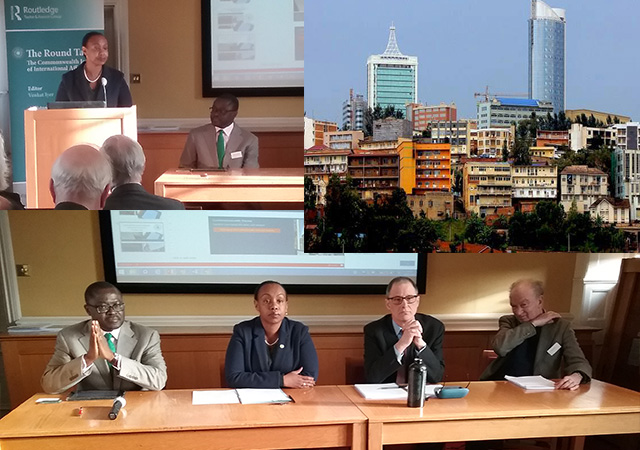 Rwanda's High Commissioner HE Yamina Claris Karitanyi at the podium, Kigali [Rwanda Development Board], Round Table conference panel on CHOGM 2020.
Rwanda's High Commissioner HE Yamina Claris Karitanyi at the podium, Kigali [Rwanda Development Board], Round Table conference panel on CHOGM 2020.
[This article appears in the Opinion section of the current edition of the Journal. Opinion pieces do not reflect the position of the Round Table Board.]
Is Rwanda a suitable host for the 2020 Commonwealth summit, given the various commitments to democracy, freedom of expression and human rights in the Commonwealth Charter 2012? Or did the leaders in London decide that the country’s impressive economic growth and recovery from the 1994 genocide outweigh any lurking anxieties from Commonwealth Charter purists?
Rwanda has divided opinion ever since before it was admitted to the association in 2009, in defiance of a critical report by Professor Yash Ghai, international chair of the Commonwealth Human Rights Initiative. He argued that Commonwealth membership was premature, for the post-genocide, Tutsi-led government of Paul Kagame did not comply with the Harare Principles. However, realpolitik and the strong support of Uganda’s Museveni (in whose bush rebellion Kagame had been a prominent commander), of other African governments, and of the United Kingdom helped overcome objections.
This was a country which may have lost 800,000 people in a genocide that shamed a world, congratulating itself too soon on an end to the cold war and apartheid. It was also, like Mozambique, a state with no direct relationship to the former British empire. Once a German colony, it had been a League of Nations Mandate for Belgium. Kagame and fellow leaders of the Rwanda Patriotic Front were Tutsi exiles who had grown up in Ugandan refugee camps, speaking English.
The fans of Rwanda point to real gross domestic product (GDP) growth of around 8% a year between 2001 and 2017, with falling poverty and inequality. Most Millennium Development Goals were achieved by 2015. ‘Vision 2020’, coincidentally the year of the Commonwealth summit, seeks GDP per head of US $1000, and significant progress is claimed in economic transformation, rural development, productivity, youth employment and, the area critics seize on, accountable governance. But how accountable is governance where Kagame has won the last two elections with presidential majorities of over 90%, and has also won a referendum to end term limits that could see him president until 2034, when he will be 77?
The real failure of the Commonwealth leaders in London, in not interrogating Rwanda’s offer to host in 2020, lies in not following through their Charter commitments to democracy (Chapter 1), human rights (Chapter 2) and freedom of expression (Chapter 5). On democracy there is well-attested evidence of harassment of government opponents such as the People Salvation Movement and the Democratic Green Party of Rwanda. Several parties were refused registration. The Commonwealth, which sent a large group of observers to the non-Commonwealth state of Zimbabwe, was never invited to the 2017 presidential election, or the referendum before.
On human rights, the High Court in London, in July 2017, forbade the extradition of five genocide suspects, citing concerns about judicial independence in Rwanda. There is ample evidence of the regime’s use of targeted assassinations against its enemies outside the country, much of it in South Africa. In 2010 South Africa recalled its high commissioner from Kigali in protest at Rwanda’s activities and in 2014, after the blatant murder of Patrick Karegeya, a former head of intelligence, it expelled four Rwandan diplomats. More recently, the South African Court of Appeal ordered the deportation of a Rwandan intelligence agent who had come to kill another exile, General Faustin Nyamwesa, who had already survived two earlier attempts on his life.
Human Rights Watch has documented 104 cases of illegal detention and torture in military detention centres between 2010 and 2017 (see www.hrw.org for articles on 18 August 2017, 28 September 2017 and 10 October 2017). In 2012 the UK, for instance, suspended its budgetary support after the Kagame regime was found to be supporting the M23 rebel group in the Democratic Republic of Congo. Rwanda is now a Commonwealth member of the Human Rights Council in Geneva – along with Australia, Kenya, Nigeria, Pakistan, South Africa and the UK. Unlike them, however, it made no voluntary pledges for supporting rights either internationally or nationally.
On freedom of expression, the BBC Kinyarwanda service was suspended indefinitely in 2014 following a critical BBC TV documentary, Rwanda’s Untold Story. Reporters without Borders states that between 1997 and 2017 eight journalists have been killed or have gone missing, 11 have been given long jail terms, and 33 have been forced to flee.
It is time to ask some hard questions about how Commonwealth leaders assess offers to host their summit meetings. At least three key states – South Africa, the UK and Canada – were aware that this government does not sit easily in the frame of Commonwealth values. Why did they not stop this choice, just as the UK and Australia attempted to stop the choice of Rajapakse’s Sri Lanka for the 2011 Commonwealth Heads of Government Meeting (CHOGM)?
It is too late to prevent the next CHOGM going to Kigali in 2020. Is it too late to rescue the Commonwealth Charter from the waste-paper basket?
Richard Bourne was the first Director of the Commonwealth Human Rights Initiative and is a member of the Round Table Editorial Board.
Related articles
The Commonwealth in 2019: Challenges and Opportunities – Round Table website
Commonwealth Association probes CHOGM outcomes and actions – The Commonwealth
What Is In For Rwanda Hosting 2020 Commonwealth Summit? – K T Press



